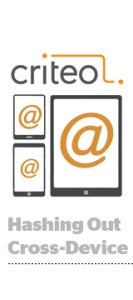 Criteo is looking to crack the cross-device nut with deterministic data.
Criteo is looking to crack the cross-device nut with deterministic data.
The French retargeting company launched a cross-device solution Tuesday that uses hashed email addresses – got to watch that personally identifiable information – to connect consumers across mobile web, apps and desktop. The solution is in the process of being rolled out to current customers.
It works like this: Criteo, which according to comScore reaches nearly 1 billion global consumers each month, enables its advertiser and publisher clients to use anonymized versions of email addresses as unique identifiers. From there, Criteo can use the hashed IDs to track a consumer’s browsing and shopping behavior. Over time, Criteo determines where users are most likely to be influenced by advertising and where they’re most likely to make their ultimate purchase. Personalized ad and product suggestions courtesy of Criteo’s internal recommendation engine follow.
It’s cross-device fueled by data about intent – and for that, probabilistic matching just wouldn’t do, said Rob Deichert, Criteo’s managing director for North America.
“When you look at all of the major players like Google and Facebook, they all have authentication,” Deichert said. “We found that a probabilistic match just doesn’t have the accuracy we want. That’s why our focus has been around making an exact match, which essentially allows us to create a kind of network effect to track behaviors everywhere.”
Which is exactly what the advertiser wants. But deterministic matching also enables a smoother opt-out process for consumers. As Deichert noted: “How do you opt out of a remarketing campaign across multiple devices if it’s done through a probabilistic match?”
For the moment, Criteo plans to focus on the online retail and travel segments, although there “isn’t actually a specific use case” for the cross-device tool, Deichert said. “And that’s because it’s always different. The machine is learning and figuring it out as it goes along. It’s more about connecting the dots.”
Criteo’s new cross-device offering fits in neatly with its heritage as a company that revolves around performance-based advertising in the lower part of the funnel, Deichert said.
“A lot of the tools out there are applied to the upper funnel, for example, extending audience,” he said. “At the end of the day, we have to tie spend back to ROI for our advertisers, because our clients expect a certain return on ad spend – our product has to fit within that model or it’s useless.”











